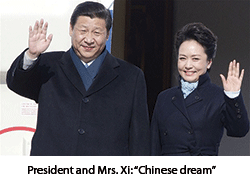 For several years, shoppers worldwide have been used to China’s omnipresence: ‘Made in China’ has long been the commonest label on the goods they buy. More recently, however, the Chinese government has been trying to sell the country itself as a brand — one that has the ability to attract people from other countries in the way that America does with its culture, products and values. A decade ago, the Communist Party of China (CPC) declared a new goal: to build ‘soft power’, as a complement to its rapidly growing economic and military strength. It spends some $10 billion (Rs.64,400 crore) a year on the project, according to David Shambaugh of George Washington University — one of the most extravagant programmes of state-sponsored image-building the world has ever seen. Shambaugh reckons that America spent less than $670 million (Rs.4,300 crore) on its ‘public diplomacy’ in 2014.
For several years, shoppers worldwide have been used to China’s omnipresence: ‘Made in China’ has long been the commonest label on the goods they buy. More recently, however, the Chinese government has been trying to sell the country itself as a brand — one that has the ability to attract people from other countries in the way that America does with its culture, products and values. A decade ago, the Communist Party of China (CPC) declared a new goal: to build ‘soft power’, as a complement to its rapidly growing economic and military strength. It spends some $10 billion (Rs.64,400 crore) a year on the project, according to David Shambaugh of George Washington University — one of the most extravagant programmes of state-sponsored image-building the world has ever seen. Shambaugh reckons that America spent less than $670 million (Rs.4,300 crore) on its ‘public diplomacy’ in 2014.
Evidently, CPC borrowed the idea of soft power from an American academic, Joseph Nye, who coined the term in 1990. Nye argued that hard power alone is not enough to wield influence in the world.
In 2013, about a year after he took over as China’s leader, Xi Jinping convened a meeting of the ruling politburo to discuss soft power. Its members agreed that it is a vital ingredient of Xi’s “Chinese dream of the great revival of the Chinese nation” — the term “Chinese dream” being one of Xi’s favourites. Since then, Xi has made himself promoter-in-chief of this new form of power (helped when he travels abroad by the highly visible presence of his elegant, smiling wife). His efforts to boost it were on display at the World Economic Forum in Davos in January, where he won plaudits for extolling globalisation and calling for unity in the fight against climate change. Even Mao Zedong, who enjoyed cult status abroad among some left-wing academics, put far less work into winning over foreigners.
Confucius, condemned by Chairman Mao as a peddler of feudal thought, is now being proffered as a sage with a message of harmony. Since 2004, China has established some 500 government-funded Confucius Institutes in 140 countries. They offer language classes, host dance troupes and teach Chinese cooking. Many of them are on campuses. China has also set up more than 1,000 Confucius Classroom arrangements with foreign schools, providing them with teachers, materials and funding to help children learn Mandarin.
China wants its message to be clearly visible in the heartland of America’s capitalist culture. Sometimes the party uses covert means to sway foreign opinion. In 2015, an investigation by Reuters revealed that a Chinese state broadcaster, China Radio International, controlled at least 33 radio stations in 14 countries, including the United States, but was using front companies to mask its ties with them. Reuters says the stations avoid airing anything that might portray China negatively.
China’s soft-power push has made some gains. In global opinion polls, respondents from Africa tend to be more positive about China than people from other regions. That is partly because of the money China has poured into the continent — in Angola, every professional football match is staged in one of four Chinese-built stadiums. Younger people everywhere often view China more favourably than older people.
But money has not bought China anything like the love it would like. A year before Xi took over, just over half of Americans had positive impressions of China, according to the Pew Research Centre. By the end of 2016, that share had fallen to 38 percent. Pew found a similar trend in other countries. In 14 of 19 nations it polled between 2011-2013, views of China became less friendly. Few people outside China want to watch its programmes, which are often thinly disguised propaganda. The success of China’s most successful film globally, Crouching Tiger, Hidden Dragon, a co-production involving American companies, hasn’t been repeated since its release in 2000. Kung Fu Panda, an American-made animated film series, has perhaps done more to boost China’s soft power than any movie made by the country itself. Small wonder that China was keen to enter into a co-production for the third in the series, which was released last year.
State-controlled media in China have reported with relish commentary in America suggesting that Donald Trump’s presidency may deal a heavy blow to the United States’ soft power. If that arises from the appeal of a country’s culture, political ideals and foreign policies, as Nye reckons, then America’s soft power is threatened in two of these domains. China’s political system may not exert much global pull, but it could begin to look a bit more attractive to some people when compared with America’s.